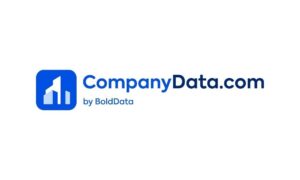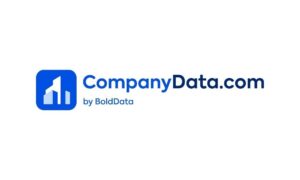
AI-powered tools are reshaping sales strategies by automating repetitive tasks, analyzing massive datasets, and delivering actionable recommendations through statistical algorithms and machine learning techniques. Predictive analytics uses historical and real-time data to forecast sales opportunities, customer behaviors, and potential revenue. In complex B2B environments, systems supported by accurate intelligence from CompanyData.com enable teams to focus on high-value activities instead of manual research.
Understanding Predictive Analytics
Predictive analytics moves beyond intuition. It uses specific data processing techniques to forecast results.
The process relies on four core components:
- Data Collection: Gathering information from CRMs, emails, and financial reports.
- Data Processing: Cleaning and organizing raw data.
- Modeling: Identifying relationships between factors like engagement and closed deals.
- Prediction: Forecasting which leads will convert or which accounts face risk.
B2B sales cycles involve long timelines and multiple stakeholders. Predictive models address these challenges by identifying early warning signs of stalled deals. They also determine the best timing for follow-ups based on successful patterns.
The Role of Accurate Company Data
Reliable predictive models require high-quality input. Incomplete business information leads to unreliable forecasts.
You need verified data types to drive outcomes:
- Ownership Structures: Identify who controls or influences a target account.
- Corporate Hierarchies: Map parent companies and subsidiaries for cross-selling.
- Financials: Use revenue figures to segment prospects based on buying intent.
Sources like CompanyData.com provide verified data covering ownership, hierarchies, and executive contacts. Integrating this data into CRMs allows for sharper segmentation and automated workflows based on real-time company changes.
Automating Sales Efficiency
AI automation removes administrative burdens. It handles routine tasks with speed and precision.
- Email Responses: AI manages routine queries and books meetings without human intervention.
- Lead Prioritization: Algorithms sort leads by conversion likelihood.
Sales teams can focus on hot prospects rather than dead ends. Custom CRM integrations further streamline this by auto-updating records and triggering reminders for next steps.
Enhancing Lead Identification
AI models analyze past conversion data and industry benchmarks to find high-potential leads.
- Early Detection: Surface companies most likely to buy before competitors do.
- Behavioral Analysis: Track digital footprints like content downloads to map purchase intent.
- Dynamic Scoring: Update lead scores in real-time based on new information.
This approach replaces static criteria with active intelligence. It ensures sales representatives engage the right buyers at the exact right moment.
Personalized AI Coaching
AI tools analyze calls and meetings to uncover performance insights.
- Interaction Review: Systems transcribe conversations to flag missed opportunities.
- Sentiment Detection: Algorithms evaluate tone and confidence levels.
- Real-Time Feedback: Managers receive instant dashboards on team performance.
If a representative uses a successful phrasing technique, the system highlights it. This allows the entire team to adopt best practices immediately.
Conclusion
AI-driven strategies optimize B2B sales by handling data gathering and forecasting.
- Automate the Process: Let technology manage qualification and admin work.
- Focus on Relationships: dedicate human effort to trust and communication.
Combining predictive analytics with verified data drives measurable growth.
Visit CompanyData.com to access the accurate business intelligence needed to power your predictive models.
About CompanyData
CompanyData.com is a global company data provider founded in 2013. The company has supported over 5,000 clients in 81 countries with verified, structured company data, and has been recognized as the best B2B Data Provider for its quality and reliability.

